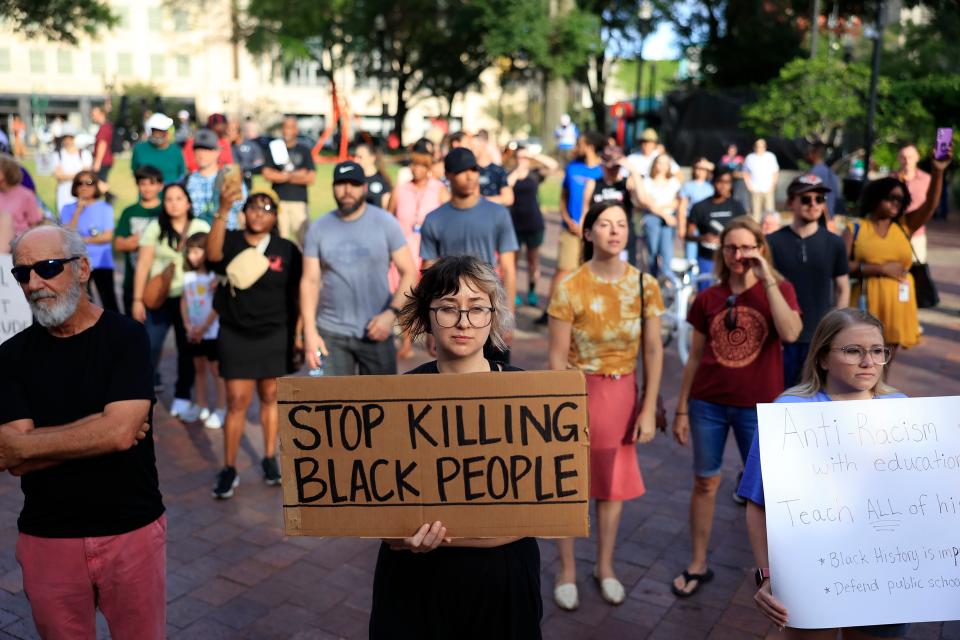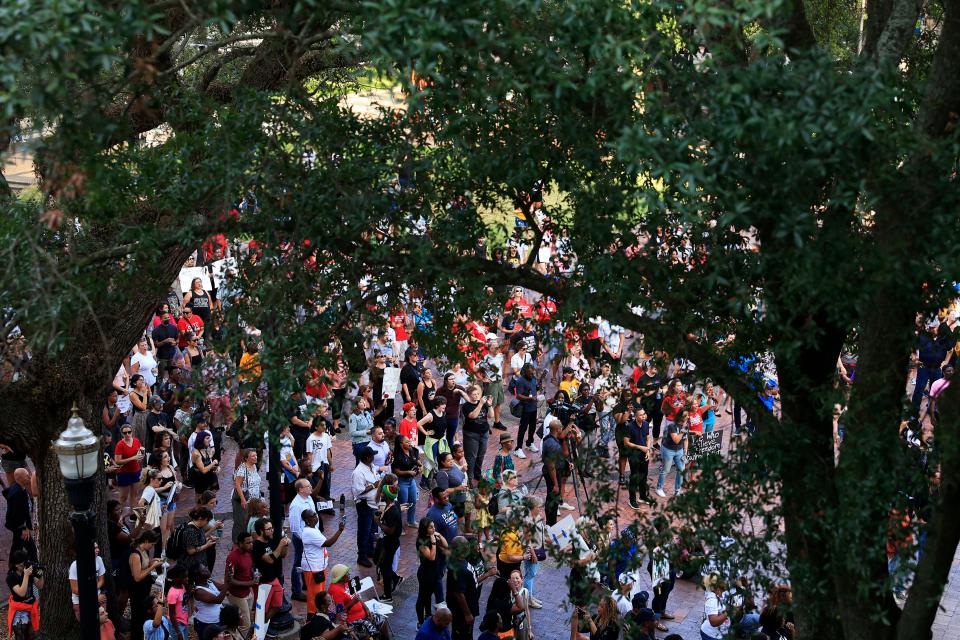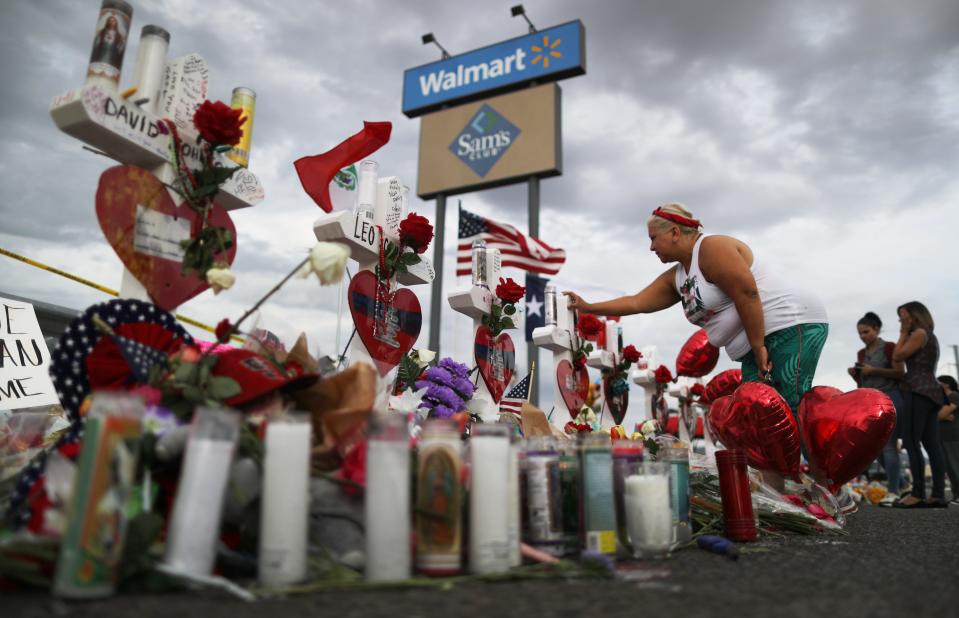Hate crimes in big cities hit record high for second year in a row, new data shows
The man who opened fire in a Dollar General store in Jacksonville, Florida, on Saturday targeted Black people because of their race, local police said. Using a rifle with a swastika drawn on it, he killed three people, deliberately targeting Black patrons, according to local authorities.
“He hated Blacks, and I think he hated just about everyone that wasn’t White,” Jacksonville Sheriff T.K. Waters told CNN. “He made that very clear.”
The events that unfolded in Jacksonville were tragic, but hardly unique. In recent years, other racist shootings left people dead in Allen and El Paso, Texas; and in Buffalo, New York. Hate crimes also expand far beyond those headlines.
A leading group of experts, in a new study provided exclusively to USA TODAY, has found the number of hate crimes reported to police in 42 major U.S. cities rose 10% last year from the year before.
And in just the country’s largest 10 cities, the number of reported hate crimes rose even more – 22% from 2021 to 2022, making last year the second consecutive year they hit a record high.
What constitutes a hate crime varies by locale; it includes murder, but also offenses such as assault and stalking. In general, a hate crime is determined by the way a perpetrator targets a specific kind of victim.
Last year, as has been the case every year since the count began, most hate-crime victims were Black, according to the Center for the Study of Hate and Extremism at California State University-San Bernardino, which collects and analyzes official state and municipal hate crime data sets.

Brian Levin, professor emeritus at the center, who has been helping collate hate crime data across the country since 1986, said while the number of crimes has dipped somewhat so far this year, he’s concerned about the presidential election season, which has historically brought with it elevated levels of hate crime.
“We really believe that this is the eye of the storm,” Levin said. “We consistently see that election years are not only elevated, but we have hundreds and hundreds of more hate crimes during those times.”
While the center’s new data tracks with national trends shown in federal crime statistics, it’s both more current and likely to be more accurate. National crime data from the FBI has only been compiled through 2021, and is notoriously inconsistent. Police agencies aren’t required to participate in the tally, and often don’t.
Jacksonville, for example – the scene of Saturday’s racist shooting – reported 11 hate crimes to the state of Florida in 2021. But it didn't report them to the FBI.
Hate crimes: In shooting over store's Pride flag, predictions of violence again become reality
Crime reporting at historic levels
The Cal State San Bernardino study tallied 3,320 reported hate crimes in 2022 in 42 cities. That’s up from 3,026 in 2021.
While the overall numbers increased, that increase wasn’t as large as the previous year. And the report notes that cities have also improved at reporting their hate crime data in recent years, which could explain some of the uptick.
The study mirrors the latest data from the FBI, which also releases an annual hate crime report.
Last year, the FBI reported that in 2021 – the latest year for which data is available – the number of hate crimes nationwide jumped 31%. The bureau is expected to release its report for 2022 later this year.
But national hate crime data is notoriously flawed, which is part of the reason the center studies data from a limited list of cities.
What is a hate crime
Different states, counties and cities define hate crimes in different ways. Four states don’t have any hate crime statute at all. Some states recognize crimes based on sexual orientation or political affiliation as hate crimes, while others don’t.
A study of 271 hate crime statutes across the country published this year by researchers at Florida Atlantic University concluded the laws were “vague and inconsistent.”
The Cal State San Bernardino study tallies information from cities where hate crime data is most accurate and consistent, Levin said.
In practice, that means largely ignoring data collected in some places – such as Florida – because it is usually so inaccurate, he said.
When it comes to hate crime data, “Florida is terribly flawed,” Levin said. “It's a real pain in the neck to get timely data.”
Levin said the entire state of Florida reports about the same number of hate crimes as the city of Boston, which just isn’t likely.

The latest data Levin has for the city of Jacksonville was 11 hate crimes reported in 2021, according to the state of Florida. Jacksonville isn’t in the list of cities the center studies.
Other cities of similar sizes reported many more hate crimes, according to the center’s study.
Michael Lieberman, senior policy counsel at the Southern Poverty Law Center, agreed that Florida’s hate crime data is woefully inaccurate.
“Florida cities are particularly bad,” Lieberman said. “Jacksonville has reported 30 hate crimes since 2013, and a city like Indianapolis – just a little bit smaller – reported 25 in 2021.”
Meanwhile, Florida has also become “ground zero” for several hot-button political debates including LGBTQ rights and immigration, Lieberman said.
Other states that don’t accurately report hate crimes include Arkansas, Virginia and Mississippi, Levin said.
Political rhetoric and mass shootings
Lieberman noted it’s not yet clear whether the Jacksonville gunman was influenced by political rhetoric.
But the SPLC and other organizations that study hate and extremism have long warned about the connections between angry political debate and resulting extremist violence.
“Words matter, and words have consequences,” Lieberman said. “And I don't think we can ignore that.”
Earlier this month, the SPLC and dozens of other organizations penned a letter to Congressional leaders urging them to tell their caucuses to refrain from using white supremacist and anti-immigrant rhetoric in campaigning and political action.
“Again and again, our country has experienced hate violence inspired by this conspiratorial rhetoric. We know this because terrorists tell us this in their screeds,” the letter reads. ”Driven by fears of ‘replacement’ and ‘invasion’” terrorists targeted the Latino community in El Paso, Texas, Black Americans in Buffalo, New York, and Jews in Pittsburgh, Pennsylvania, and in Poway, California, among other communities.”

The center’s new data reflects how political discourse can drive hate crimes.
The COVID-19 pandemic, for example, with its corresponding anti-Asian political messaging from then-President Trump and others, saw a sharp increase in hate crimes against Asian-Americans and Pacific Islanders, Levin said. The past two years, as the far-right has galvanized its campaign against LGBTQ rights, have seen hate crimes swell against gender-nonconforming Americans.
Special report: A drag show, a protest and a line of guns. How the battle over one issue is tearing at America
In 2019, following months of anti-immigrant political hyperbole including repeated warnings from Trump of an “invasion” at the southern US border, a 21-year-old man drove 650 miles from Dallas to the border city of El Paso and shot and killed 23 people at a Walmart.
That’s why experts like Levin are so worried about the coming months. With a contentious presidential election and with the leading GOP candidate facing four criminal indictments, he and others are bracing for hate crime figures to soar.
“What we are seeing is a conveyor belt of ticking young time-bombs,” Levin said. “We're entering a season where the dry kindling of radicalization is increased, because during election time folks tend to be inundated with rhetoric that is very over-the-top and tribalist.”
This article originally appeared on USA TODAY: Jacksonville shooting's larger trend: Hate crimes rise across US